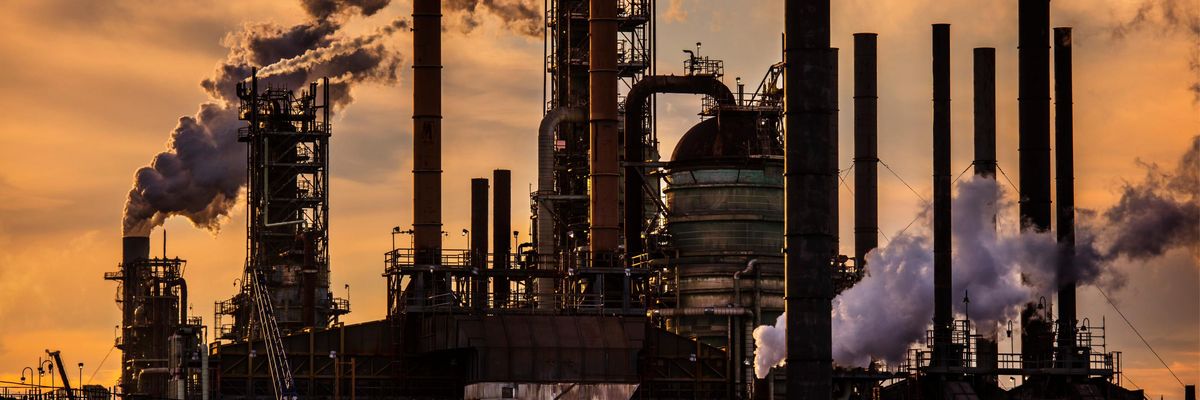

SUBSCRIBE TO OUR FREE NEWSLETTER
Daily news & progressive opinion—funded by the people, not the corporations—delivered straight to your inbox.
5
#000000
#FFFFFF
To donate by check, phone, or other method, see our More Ways to Give page.


Daily news & progressive opinion—funded by the people, not the corporations—delivered straight to your inbox.

An ExxonMobil oil refinery, the second largest in the U.S., is shown on February 28, 2020 in Baton Rouge, Louisiana. (Photo: Barry Lewis/InPictures via Getty Images)
Countries' current climate pledges put the world "on track for a catastrophic global temperature rise" of about 2.7degC, United Nations Secretary-General Antonio Guterres warned Tuesday, calling a new report released ahead of a key summit "another thundering wake-up call."
"The era of half-measures and hollow promises must end."
The Emissions Gap Report 2021, an annual assessment from the U.N. Environment Program (UNEP), comes as world leaders prepare to meet in Glasgow, Scotland on Sunday for COP 26. They are set to discuss efforts to meet the Paris climate agreement, which aims to keep global temperature rise this century "well below" 2degC, preferably limiting it to 1.5degC.
However, countries' latest Nationally Determined Contributions (NDCs), along with other commitments made for 2030, suggest the international community will blow past both of those targets without more ambitious action to slash emissions, according to the UNEP report.
"The emissions gap is the result of a leadership gap," Guterres declared in his Tuesday address, noting that the report "shows that countries are squandering a massive opportunity to invest Covid-19 fiscal and recovery resources in sustainable, cost-saving, planet-saving ways."
"Scientists are clear on the facts. Now leaders need to be just as clear in their actions," he said. "They need to come to Glasgow with bold, time-bound, front-loaded plans to reach net-zero."
"To decarbonize every sector--from power, to transport, farming, and forestry. To phase out coal," the U.N. chief continued. "To end subsidies for fossil fuels and polluting industries. To put a price on carbon, and to channel that back to creating green jobs. And obviously, to provide at least $100 billion each year to the developing world for climate finance."
"Leaders can still make this a turning point to a greener future instead of a tipping point to climate catastrophe," said Guterres. "The era of half-measures and hollow promises must end."
Various assessments released before the summit in Scotland have underscored the necessity of bold and immediate action, including the latest from the Intergovernmental Panel on Climate Change as well as the World Meteorological Organization's announcement Monday that carbon dioxide concentrations in 2020 hit levels not seen for roughly three million years.
Related Content

Reflecting "a world of climate promises not yet delivered," the new UNEP report also serves as a call to action, particularly for rich nations most responsible for the climate emergency.
The report details how parties to the Paris agreement have put forth "insufficient" climate plans. The NDCs for 2030, if continued throughout this century, would still lead to a global temperature rise of 2.7degC beyond pre-industrial levels. Achieving nations' net-zero pledges "would improve the situation, limiting warming to about 2.2degC" by 2100.
However, Group of 20 (G20) nations--the world's top economies--"do not have policies in place to achieve even the NDCs," the report says, and making changes to meet the 2030 commitments would not be enough to put countries on a "clear path towards net-zero."
Meanwhile, this year "thousands of people have been killed or displaced and economic losses are measured in the trillions," the report highlights, pointing to "extreme weather events around the world--including flooding, droughts, wildfires, hurricanes, and heatwaves."
As Inger Andersen, executive director of UNEP, put it: "Climate change is no longer a future problem. It is a now problem."
"To stand a chance of limiting global warming to 1.5degC, we have eight years to almost halve greenhouse gas emissions: eight years to make the plans, put in place the policies, implement them and ultimately deliver the cuts," Andersen said. "The clock is ticking loudly."
"The world has to wake up to the imminent peril we face as a species," she added, calling on countries to urgently implement policies to meet existing commitments. "It is also essential to deliver financial and technological support to developing nations--so that they can both adapt to the impacts of climate change already here and set out on a low-emissions growth path."
Related Content

The report factors in new or updated NDCs from 121 parties, responsible for just over half of planet-heating emissions, submitted by the end of September as well as pledges from China, Japan, and South Korea--though countries continue to put forward plans in the lead-up to the summit.
Alok Sharma, incoming COP 26 president, noted Tuesday that previous analyses projected "commitments made in Paris would have capped the rise in temperature to below 4degC."
"So there has been progress, but not enough," he said, referencing the new report. "That is why we especially need the biggest emitters, the G20 nations, to come forward with stronger commitments to 2030 if we are to keep 1.5degC in reach over this critical decade."
Dear Common Dreams reader, The U.S. is on a fast track to authoritarianism like nothing I've ever seen. Meanwhile, corporate news outlets are utterly capitulating to Trump, twisting their coverage to avoid drawing his ire while lining up to stuff cash in his pockets. That's why I believe that Common Dreams is doing the best and most consequential reporting that we've ever done. Our small but mighty team is a progressive reporting powerhouse, covering the news every day that the corporate media never will. Our mission has always been simple: To inform. To inspire. And to ignite change for the common good. Now here's the key piece that I want all our readers to understand: None of this would be possible without your financial support. That's not just some fundraising cliche. It's the absolute and literal truth. We don't accept corporate advertising and never will. We don't have a paywall because we don't think people should be blocked from critical news based on their ability to pay. Everything we do is funded by the donations of readers like you. Will you donate now to help power the nonprofit, independent reporting of Common Dreams? Thank you for being a vital member of our community. Together, we can keep independent journalism alive when it’s needed most. - Craig Brown, Co-founder |
Countries' current climate pledges put the world "on track for a catastrophic global temperature rise" of about 2.7degC, United Nations Secretary-General Antonio Guterres warned Tuesday, calling a new report released ahead of a key summit "another thundering wake-up call."
"The era of half-measures and hollow promises must end."
The Emissions Gap Report 2021, an annual assessment from the U.N. Environment Program (UNEP), comes as world leaders prepare to meet in Glasgow, Scotland on Sunday for COP 26. They are set to discuss efforts to meet the Paris climate agreement, which aims to keep global temperature rise this century "well below" 2degC, preferably limiting it to 1.5degC.
However, countries' latest Nationally Determined Contributions (NDCs), along with other commitments made for 2030, suggest the international community will blow past both of those targets without more ambitious action to slash emissions, according to the UNEP report.
"The emissions gap is the result of a leadership gap," Guterres declared in his Tuesday address, noting that the report "shows that countries are squandering a massive opportunity to invest Covid-19 fiscal and recovery resources in sustainable, cost-saving, planet-saving ways."
"Scientists are clear on the facts. Now leaders need to be just as clear in their actions," he said. "They need to come to Glasgow with bold, time-bound, front-loaded plans to reach net-zero."
"To decarbonize every sector--from power, to transport, farming, and forestry. To phase out coal," the U.N. chief continued. "To end subsidies for fossil fuels and polluting industries. To put a price on carbon, and to channel that back to creating green jobs. And obviously, to provide at least $100 billion each year to the developing world for climate finance."
"Leaders can still make this a turning point to a greener future instead of a tipping point to climate catastrophe," said Guterres. "The era of half-measures and hollow promises must end."
Various assessments released before the summit in Scotland have underscored the necessity of bold and immediate action, including the latest from the Intergovernmental Panel on Climate Change as well as the World Meteorological Organization's announcement Monday that carbon dioxide concentrations in 2020 hit levels not seen for roughly three million years.
Related Content

Reflecting "a world of climate promises not yet delivered," the new UNEP report also serves as a call to action, particularly for rich nations most responsible for the climate emergency.
The report details how parties to the Paris agreement have put forth "insufficient" climate plans. The NDCs for 2030, if continued throughout this century, would still lead to a global temperature rise of 2.7degC beyond pre-industrial levels. Achieving nations' net-zero pledges "would improve the situation, limiting warming to about 2.2degC" by 2100.
However, Group of 20 (G20) nations--the world's top economies--"do not have policies in place to achieve even the NDCs," the report says, and making changes to meet the 2030 commitments would not be enough to put countries on a "clear path towards net-zero."
Meanwhile, this year "thousands of people have been killed or displaced and economic losses are measured in the trillions," the report highlights, pointing to "extreme weather events around the world--including flooding, droughts, wildfires, hurricanes, and heatwaves."
As Inger Andersen, executive director of UNEP, put it: "Climate change is no longer a future problem. It is a now problem."
"To stand a chance of limiting global warming to 1.5degC, we have eight years to almost halve greenhouse gas emissions: eight years to make the plans, put in place the policies, implement them and ultimately deliver the cuts," Andersen said. "The clock is ticking loudly."
"The world has to wake up to the imminent peril we face as a species," she added, calling on countries to urgently implement policies to meet existing commitments. "It is also essential to deliver financial and technological support to developing nations--so that they can both adapt to the impacts of climate change already here and set out on a low-emissions growth path."
Related Content

The report factors in new or updated NDCs from 121 parties, responsible for just over half of planet-heating emissions, submitted by the end of September as well as pledges from China, Japan, and South Korea--though countries continue to put forward plans in the lead-up to the summit.
Alok Sharma, incoming COP 26 president, noted Tuesday that previous analyses projected "commitments made in Paris would have capped the rise in temperature to below 4degC."
"So there has been progress, but not enough," he said, referencing the new report. "That is why we especially need the biggest emitters, the G20 nations, to come forward with stronger commitments to 2030 if we are to keep 1.5degC in reach over this critical decade."
Countries' current climate pledges put the world "on track for a catastrophic global temperature rise" of about 2.7degC, United Nations Secretary-General Antonio Guterres warned Tuesday, calling a new report released ahead of a key summit "another thundering wake-up call."
"The era of half-measures and hollow promises must end."
The Emissions Gap Report 2021, an annual assessment from the U.N. Environment Program (UNEP), comes as world leaders prepare to meet in Glasgow, Scotland on Sunday for COP 26. They are set to discuss efforts to meet the Paris climate agreement, which aims to keep global temperature rise this century "well below" 2degC, preferably limiting it to 1.5degC.
However, countries' latest Nationally Determined Contributions (NDCs), along with other commitments made for 2030, suggest the international community will blow past both of those targets without more ambitious action to slash emissions, according to the UNEP report.
"The emissions gap is the result of a leadership gap," Guterres declared in his Tuesday address, noting that the report "shows that countries are squandering a massive opportunity to invest Covid-19 fiscal and recovery resources in sustainable, cost-saving, planet-saving ways."
"Scientists are clear on the facts. Now leaders need to be just as clear in their actions," he said. "They need to come to Glasgow with bold, time-bound, front-loaded plans to reach net-zero."
"To decarbonize every sector--from power, to transport, farming, and forestry. To phase out coal," the U.N. chief continued. "To end subsidies for fossil fuels and polluting industries. To put a price on carbon, and to channel that back to creating green jobs. And obviously, to provide at least $100 billion each year to the developing world for climate finance."
"Leaders can still make this a turning point to a greener future instead of a tipping point to climate catastrophe," said Guterres. "The era of half-measures and hollow promises must end."
Various assessments released before the summit in Scotland have underscored the necessity of bold and immediate action, including the latest from the Intergovernmental Panel on Climate Change as well as the World Meteorological Organization's announcement Monday that carbon dioxide concentrations in 2020 hit levels not seen for roughly three million years.
Related Content

Reflecting "a world of climate promises not yet delivered," the new UNEP report also serves as a call to action, particularly for rich nations most responsible for the climate emergency.
The report details how parties to the Paris agreement have put forth "insufficient" climate plans. The NDCs for 2030, if continued throughout this century, would still lead to a global temperature rise of 2.7degC beyond pre-industrial levels. Achieving nations' net-zero pledges "would improve the situation, limiting warming to about 2.2degC" by 2100.
However, Group of 20 (G20) nations--the world's top economies--"do not have policies in place to achieve even the NDCs," the report says, and making changes to meet the 2030 commitments would not be enough to put countries on a "clear path towards net-zero."
Meanwhile, this year "thousands of people have been killed or displaced and economic losses are measured in the trillions," the report highlights, pointing to "extreme weather events around the world--including flooding, droughts, wildfires, hurricanes, and heatwaves."
As Inger Andersen, executive director of UNEP, put it: "Climate change is no longer a future problem. It is a now problem."
"To stand a chance of limiting global warming to 1.5degC, we have eight years to almost halve greenhouse gas emissions: eight years to make the plans, put in place the policies, implement them and ultimately deliver the cuts," Andersen said. "The clock is ticking loudly."
"The world has to wake up to the imminent peril we face as a species," she added, calling on countries to urgently implement policies to meet existing commitments. "It is also essential to deliver financial and technological support to developing nations--so that they can both adapt to the impacts of climate change already here and set out on a low-emissions growth path."
Related Content

The report factors in new or updated NDCs from 121 parties, responsible for just over half of planet-heating emissions, submitted by the end of September as well as pledges from China, Japan, and South Korea--though countries continue to put forward plans in the lead-up to the summit.
Alok Sharma, incoming COP 26 president, noted Tuesday that previous analyses projected "commitments made in Paris would have capped the rise in temperature to below 4degC."
"So there has been progress, but not enough," he said, referencing the new report. "That is why we especially need the biggest emitters, the G20 nations, to come forward with stronger commitments to 2030 if we are to keep 1.5degC in reach over this critical decade."